Established as a top level talent, he quickly settled into the routine of the best European players, competing for his club team each season followed by suiting up for his country at the World Championships each spring, augmented by the Olympics every four years. This pattern for Nedomanský began in 1964-65 when he made his first World Championship appearance for Czechoslovakia at the 1965 World Championships.
Going up against the might of the Soviet Union, who were in the midst of a nine year run as world champions, Nedomanský won silver medals in his first two tries, 1965 and 1966.
He had an outstanding domestic season for Slovan in 1966-67 when he scored a league leading 40 goals and 60 points in just 36 games to lead the league in scoring for the first time.
During a 31 goal, 46 point campaign in 1967-68, Nedomanský made his first Olympic appearance in 1968 in Grenoble, France where his 5 goals and 7 points in 7 games helped the Czechs to a silver medal.
Over the course of the next three seasons the cycle of domestic season followed by the World Championships continued, highlighted by a 48 point season in 1968-69 in 36 games and an emotional defeat of the Soviet Union in 1969, as the Soviets had invaded Czechoslovakia in 1968 following the reforms granting more freedoms to the Czech citizens by President Alexander Dubcek by loosening restrictions on the media, art, speech and travel during the Prague Spring of 1968. Dubcek had been arrested and the country taken over by 750,000 troops in the space of 24 hours, which resulted in 108 Czech and Slovak deaths and 500 injuries to primarily civilians. Despite being arrested and taken to Moscow, Dubček was allowed to remain in office and was returned to Prague a week later.
The invasion also cost Czechoslovakia the 1969 World Championships, which they were scheduled to host, but the tournament had to be moved to Sweden in light of the situation. So when the World Championships arrived seven months later, the games between Czechoslovakia and the Soviets held an importance beyond sport.
Spurned on by their emotions, the Czechs won the game as legendary goalkeeper Vladimir Dzurilla held the Soviets at bay for a 2-0 shutout, sending thousands of Czechoslovakians into the streets back in Prague in celebration.
Overcome by a vicarious sense of triumph, a huge and excited crowd swarmed into Prague’s Wenceslas Square. One happy hockey fan carried a poster that read BREZHNEV 3, DUBČEK 4. The crowd chanted, “We’ve beaten you this time!” Someone shouted, “The Russian coach will go to Siberia!”
Drained by their efforts, the Czechs lost to Sweden 1-0 and dropped to the bronze medal, which was determined by goal differential, with the gold going to the Soviets and the silver to Sweden, who all finished with an 8-2 record.
After a bronze medal in 1970, he led the Czechoslovak Extraliga in points in 1971 with 55 as well as leading the World Championships in goals with 8 as the Czechs took home another World Championship silver medal in 1971.
A strong 1971-72 season as Nedomanský lead the league in both goals (31) and points (52) for Bratislava. 1972 also saw a change in international hockey, as for the first time both the Olympics and a separate World Championships were held during the same year, as previous to 1972, the World Championships were not held during Olympic years.
Nedomanský and the Czechs defeated Japan 8-2 to moved to the Final Round, where they went 3-2, defeating Poland, Finland and Sweden to take home the bronze in February.
Later in April, the Czechs hosted the World Championships in Prague, where they opened their tournament with a demolition of Switzerland 19-1! They then defeated Sweden and West Germany before battling the Soviet Union to a 3-3 draw, followed by a win over Finland. They then faced each of the same five teams again in the double round robin format and reeled off wins over Switzerland Sweden, West Germany, a vital 3-2 defeat of the Soviets and capped off their schedule with a 8-2 win against the Finns to finish undefeated at 9-0-1, sending the home fans into the streets in celebration as they captured the third gold medal in their history and first since 1949 and ending a decade of Soviet dominance. During the World Championships, Nedomanský had 9 goals to lead the tournament and 15 points in 9 games played.
For the 1972-73 season, the world of hockey began to change, as the NHL expanded by two teams to combat the arrival of the upstart World Hockey Association, which began play with 12 teams, leaving 14 new teams looking to fill roughly 280 roster positions.
Meanwhile, in Czechoslovakia, it was business as usual, with Nedomanský playing his 11th season for Slovan Bratislava, although his production slipped to 22 goals, but still averaged over a point per game. The 1973 World Championships saw him bring home another medal, this one a bronze.
The 1973-74 season saw Nedomanský set a career highs in goals with 46 and points with 74, easily topping his previous high of 60 points to lead the league in both categories once again. Additionally, the Czechs had handed the Soviets their worst ever defeat at the 1974 World Championships by a score of 7-2, known as "The Perfect Game". At the conclusion of the tournament, during which the Czechs won silver, Nedomanský was named the Top Forward following his tournament high 10 goals and 13 points in 10 games, cementing his reputation as one of the finest hockey players in the world not in the North American professional ranks thanks to his consistently strong domestic and World Championship performances.
Meanwhile in North America, the WHA had grown to 14 teams and the NHL to 18, another 6 clubs and 120 roster spots to fill. The WHA in particular, began turning it's attention to Europe for talent, highlighted by the arrival of Swedes Ulf Nilsson and Anders Hedberg in Winnipeg. While the Soviet players were considered impossible targets, many teams began to ponder the possibility of obtaining a player from Czechoslovakia, as they had seen what conditions were like on the other side of the Iron Curtain during their travels.
One team in position to make such an long shot a possibility was the Toronto Toros of the WHA, who had established contacts with agents in Eastern Europe and had owner in John Bassett Jr.'s very politically well connected father John Bassett Sr. on their side.
When the Toros and the NHL's Atlanta Flames failed in their negotiations for Nedomansky's legal release from Czechoslovakia, Nedomanský, his wife and son obtained a travel visa and packed minimal luggage, so as not to draw any undue attention among government officials, and headed off "on vacation" to Switzerland.
Once in Bern, he contacted the Toros and the Flames, who immediately sent representatives over to negotiate for his services. Toronto won out and quickly ran to the Canadian consulate to obtain the proper paperwork for their new player and his family to come to Canada, making him the first player from a communist country to defect.
Meanwhile, back in Czechoslovakia, it was as if he never existed despite being the national team captain for ten years, as former teammates were afraid to even speak his name for fear of who might be listening.
He would score three goals in his first five games with the Toros as the club set as all-time attendance record of 14,000 in his first game.
The rest of his first season in Toronto was a success, as he scored 41 goals and 81 points in 78 games for third on the team in scoring. He topped that the next year with a team leading 98 points while finishing third in the league with 56 goals.
Just 12 games into the 1977-78 season, and having scored just 2 goals, Nedomanský was traded to the Detroit Red Wings of the NHL, the first ever inter-league trade.
Nedomanský would play five seasons in Detroit, with highs of 38 goals in 1978-79 and 74 points the following season. As he past 35 years of age, his production began to wane and he was signed as a free agent by the New York Rangers for the 1982-83 season, but was claimed by the St. Louis Blues as the season was about to begin. After 22 games with St. Louis, he was traded to the Rangers where he competed in the final 35 games of his career.
In all, Nedomanský scored 534 goals in Czechoslovakia, the WHA and the NHL combined while leading the Czechoslovak Extraliga in goals three times and points for times. Additionally, he added another 78 goals during the Olympics and World Championships, where he earned a silver and bronze Olympic medals and one gold, four silver and three bronze - eight total out of a possible nine - World Championship medals.
Nedomanský was inducted into the IIHF Hall of Fame in 1997 as well as the Czech Hockey Hall of Fame.
Bonus jersey: Today's bonus jersey is a 1976 WHA All-Star Game Václav Nedomansky jersey. In 1976, the WHA used a unique format which saw the all-stars from the Canadian based teams (regardless of the players citizenship) taking on a team of all-stars from teams based in the United States, which was won by Canada 6-1 in Cleveland, Ohio.
Here is a special treat, footage of Czechoslovakia beating the Soviet Union at the 1969 World Championships, showing footage from the game as well as the heroes welcome they received when they returned home.

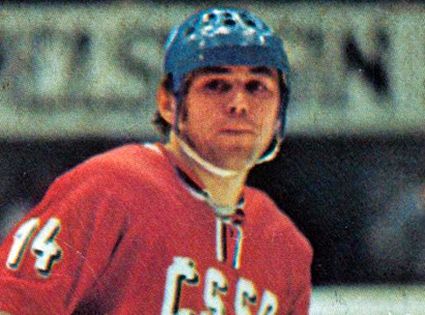
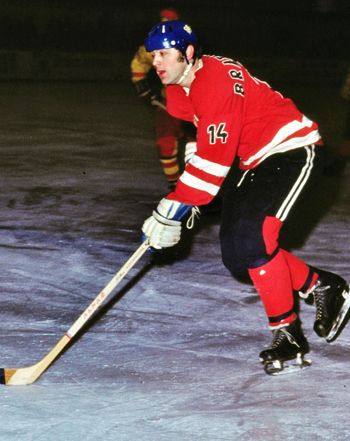
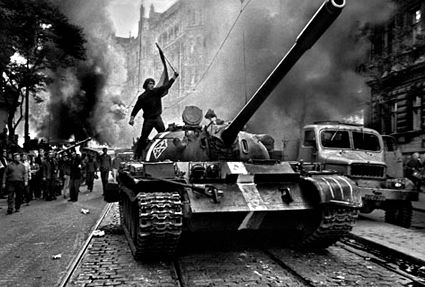
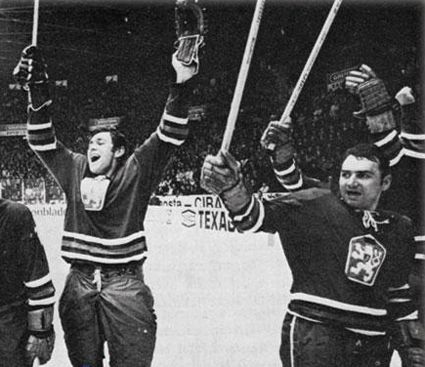
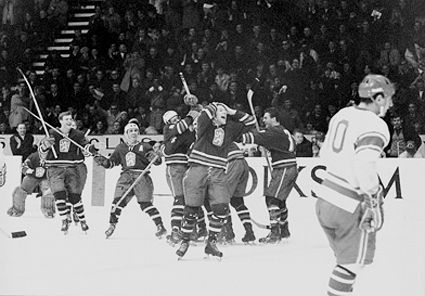
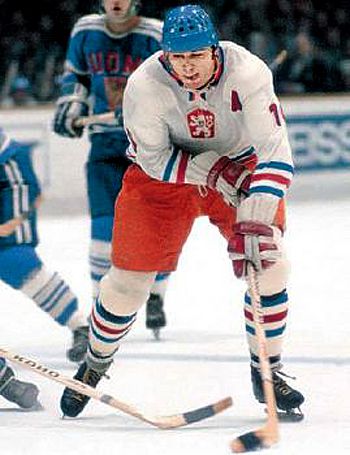
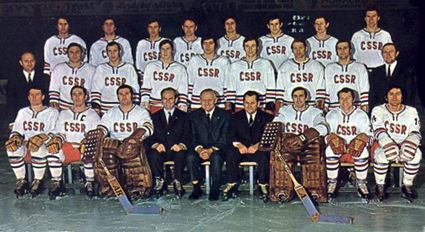
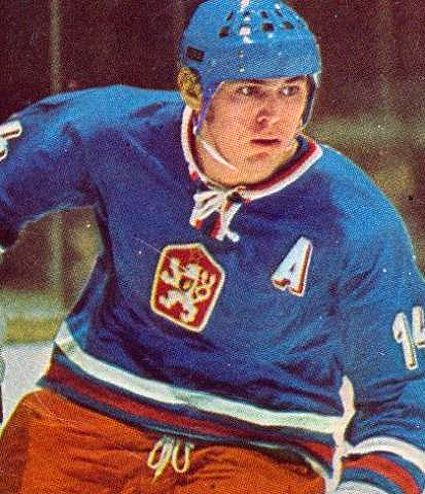
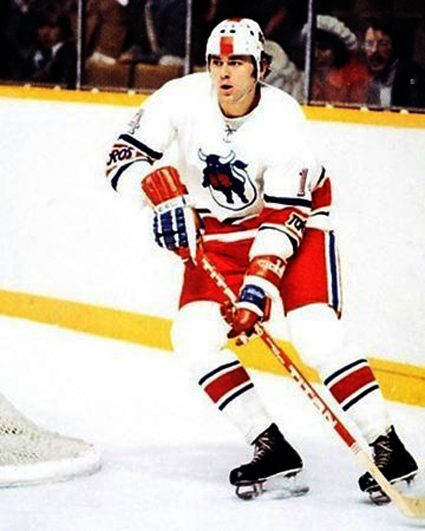
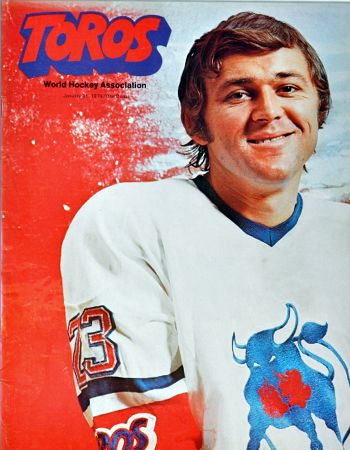
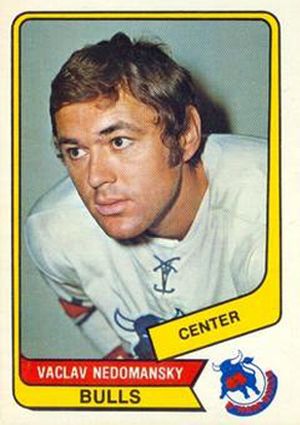
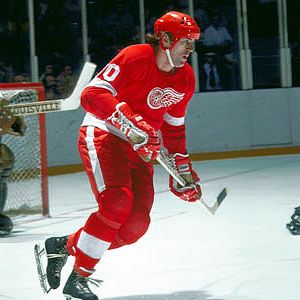
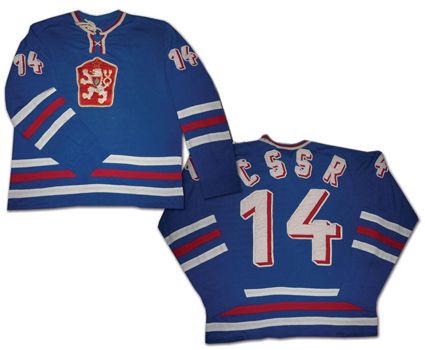
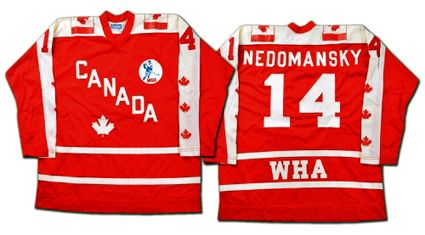










No comments:
Post a Comment
We welcome and encourage genuine comments and corrections from our readers. Please no spam. It will not be approved and never seen.